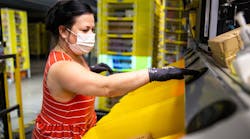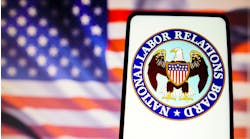Before Amazon founder Jeff Bezos officially retired as the e-commerce giant’s CEO, the company attempted to address criticism that it drives its workers too hard by adopting a new policy allowing them to take more time off without fear.
The e-commerce giant also announced that it eliminated testing job applicants for marijuana, both surprising stances for the company that currently has about 1.3 million employees worldwide.
Over the years, Amazon has come under intense scrutiny for its work practices, including news reports both in the U.S. and overseas that some fulfillment centers put unrelenting pressure on workers to fill orders, sometimes in overheated facilities.
In June, Dave Clark, Amazon’s worldwide consumer CEO, announced a modification of its corporate-wide policy called Time off Task. This policy is described as a method for measuring the amount of time employees are logged on to the software tools in their work area, and in the past has been used to alert management when workers appear not to be working or there is a problem with the systems that requires attention and fixing.
“The primary goal of the Time off Task metric is to understand whether there are issues with the tools that people use to be productive, and only secondarily to identify under-performing employees,” Clark claimed. He said Amazon is now averaging Time off Task over a longer period “to ensure that there’s more signal and less noise—reinforcing the original intent of the program, and focusing Time off Task conversations on how we can help.”
He emphasized that the new goal is to re-focus the conversations on instances where there are likely true operational issues to resolve. “We believe this change will help ensure the Time off Task policy is used in the way it was intended.”
At the same time as the Time off Task announcement, Clark also said Amazon is adjusting its drug testing policy. In the past, like many other employers, the company had disqualified people from working at Amazon if they tested positive for marijuana use.
“However, given where state laws are moving across the U.S., we’ve changed course. We will no longer include marijuana in our comprehensive [pre-employment] drug screening program for any positions not regulated by the Department of Transportation, and will instead treat it the same as alcohol use.”
Clark also stressed that the company will continue to do impairment checks on the job and will test for all drugs and alcohol after any incident.
In addition, he announced that Amazon’s public policy team now is actively supporting The Marijuana Opportunity Reinvestment and Expungement Act of 2021 (MORE Act), legislation being considered by Congress that is intended to legalize marijuana at the federal level, expunge criminal records and invest in impacted communities. “We hope that other employers will join us, and that policymakers will act swiftly to pass this law,” Clark declared.
Commenting on this development, attorney J. Stephen Smith of the law firm of Graydon Head & Ritchey said, “The difficulty is to come. If there is a workplace incident such as a forklift accident, the testing will be done afterward.”
In the case of alcohol, a BAC number will result, indicating whether the employee was impaired. With marijuana, the test will only reveal that the employee has a level of THC in their system from sometime during the past month or so. Repeat testing can only determine if an employee is using more or less THC over a period of time, but not exactly when they were THC impaired, Smith points out.
“Without a zero tolerance policy for THC, what is the resulting employment outcome in the case of an accident?” he asks. “An alcohol impaired employee is likely terminated if drunk while working and involved in an accident. If an employee has a level of THC in their system, on the other hand, but there is no method to determine ‘when’, then what? It will be very interesting to watch Amazon’s posture evolve moving forward.”
If you think that Smith believes this is a bad thing, you couldn’t be more wrong. In fact, he argues that this could possibly turn out to provide additional support for legalizing marijuana if the new company policy proceeds without major incident over time, which in the end would be a good thing.
“Amazon is a giant, and has no doubt vetted this position to the granular level internally and externally. This will certainly make hiring easier for Amazon, and will likely attract good workers who use marijuana responsibly, the way others use alcohol,” he notes.
“The excitement will be when Amazon shows the world that the wheels didn’t fall off, attracting more companies to join Amazon’s position. In turn, when enough large companies push the federal government to remove marijuana’s Controlled Substances Act listing as a Schedule I narcotic, it might happen.”




